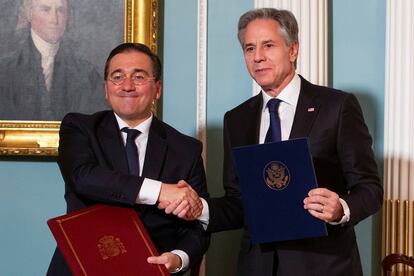Spain and US acknowledge their differences over recognition of Palestinian state
Foreign minister José Manuel Albares met in Washington with State Secretary Antony Blinken and said he was not there to request ‘acquiescence’


Spain’s Minister of Foreign Affairs, José Manuel Albares, and U.S. Secretary of State Antony Blinken on Friday illustrated their countries’ differences regarding the recognition of Palestinian statehood. While Albares announced the Spanish government’s intention to take that step in the coming days, Blinken reiterated that recognition must occur “at the end of the process,” as a result of a peace agreement between Israelis and Palestinians, according to Spanish diplomatic sources. The same sources stressed that Blinken added this is a sovereign decision to be made by each country and expressed respect.
In statements to reporters, Albares insisted that the goal of his trip to Washington was not to “ask permission” from the U.S. Administration — as he has been accused of doing by Spain’s leftist political group Izquierda Unida (United Left) — nor to inform Blinken in advance about the decision that the Spanish executive will take. “It has not been discussed in these terms, nor does Blinken feel that this is a request for acquiescence,” said Albares, acknowledging that, while discussing the Middle East conflict, he explained Spain’s position on the matter, which is well known and includes the immediate recognition of the Palestinian State. Albares declined to confirm whether the date chosen by Spain and other European countries, such as Ireland, Malta and Slovenia to formalize diplomatic recognition is May 21, as reported. He insisted that “the important thing is the political decision, which has already been made.”
Although the Spanish foreign minister downplayed the differences between Washington and Madrid on the issue of the war in Gaza, these were evident this Friday at the General Assembly vote in favor of the Security Council’s reconsideration of Palestine’s full UN membership. Spain (along with 142 other countries) voted in favor besides co-sponsoring the initiative, and the United States voted against.
The Arab-Israeli conflict was the only point of friction in a meeting that took place in an atmosphere of “great cordiality” according to Spanish diplomatic sources, and lasted for one hour and 25 minutes, preceded by a brief talk between the two officials who discussed “confidential matters.”
Sign up for our weekly newsletter to get more English-language news coverage from EL PAÍS USA Edition
Tu suscripción se está usando en otro dispositivo
¿Quieres añadir otro usuario a tu suscripción?
Si continúas leyendo en este dispositivo, no se podrá leer en el otro.
FlechaTu suscripción se está usando en otro dispositivo y solo puedes acceder a EL PAÍS desde un dispositivo a la vez.
Si quieres compartir tu cuenta, cambia tu suscripción a la modalidad Premium, así podrás añadir otro usuario. Cada uno accederá con su propia cuenta de email, lo que os permitirá personalizar vuestra experiencia en EL PAÍS.
¿Tienes una suscripción de empresa? Accede aquí para contratar más cuentas.
En el caso de no saber quién está usando tu cuenta, te recomendamos cambiar tu contraseña aquí.
Si decides continuar compartiendo tu cuenta, este mensaje se mostrará en tu dispositivo y en el de la otra persona que está usando tu cuenta de forma indefinida, afectando a tu experiencia de lectura. Puedes consultar aquí los términos y condiciones de la suscripción digital.








































